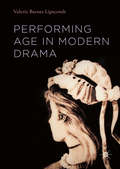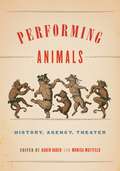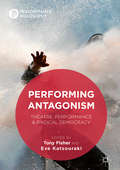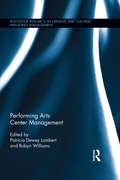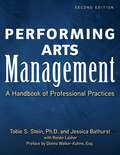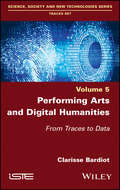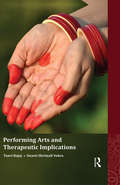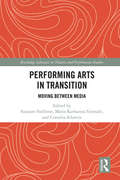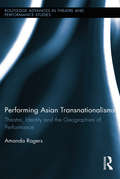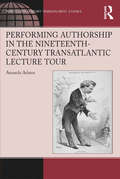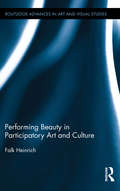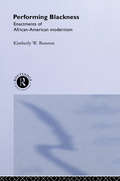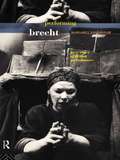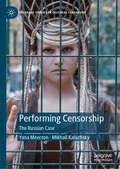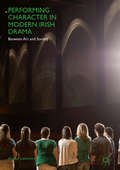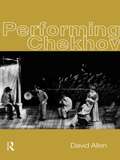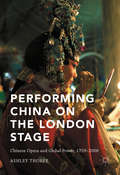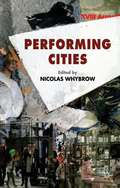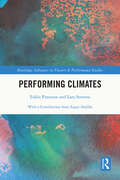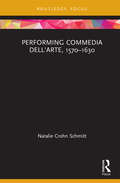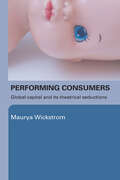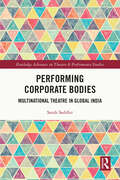- Table View
- List View
Performing Age in Modern Drama
by Valerie Barnes Barnes LipscombThis book is the first to examine age across the modern and contemporary dramatic canon, from Arthur Miller and Tennessee Williams to Paula Vogel and Doug Wright. All ages across the life course are interpreted as performance and performative both on page and on stage, including professional productions and senior-theatre groups. The common admonition "act your age" provides the springboard for this study, which rests on the premise that age is performative in nature, and that issues of age and performance crystallize in the theatre. Dramatic conventions include characters who change ages from one moment to the next, overtly demonstrating on stage the reiterated actions that create a performative illusion of stable age. Moreover, directors regularly cast actors in these plays against their chronological ages. Lipscomb contends that while the plays reflect varying attitudes toward performing age, as a whole they reveal a longing for an ageless self, a desire to present a consistent, unified identity. The works mirror prevailing social perceptions of the aging process as well as the tension between chronological age, physiological age, and cultural constructions of age.
Performing Animals: History, Agency, Theater (Animalibus)
by Karen Raber Monica MattfeldFrom bears on the Renaissance stage to the equine pageantry of the nineteenth-century hunt, animals have been used in human-orchestrated entertainments throughout history. The essays in this volume present an array of case studies that inspire new ways of interpreting animal performance and the role of animal agency in the performing relationship.In exploring the human-animal relationship from the early modern period to the nineteenth century, Performing Animals questions what it means for an animal to “perform,” examines how conceptions of this relationship have evolved over time, and explores whether and how human understanding of performance is changed by an animal’s presence. The contributors discuss the role of animals in venues as varied as medieval plays, natural histories, dissections, and banquets, and they raise provocative questions about animals’ agency. In so doing, they demonstrate the innovative potential of thinking beyond the boundaries of the present in order to dismantle the barriers that have traditionally divided human from animal.From fleas to warhorses to animals that “perform” even after death, this delightfully varied volume brings together examples of animals made to “act” in ways that challenge obvious notions of performance. The result is an eye-opening exploration of human-animal relationships and identity that will appeal greatly to scholars and students of animal studies, performance studies, and posthuman studies.In addition to the editors, the contributors are Todd Andrew Borlik, Pia F. Cuneo, Kim Marra, Richard Nash, Sarah E. Parker, Rob Wakeman, Kari Weil, and Jessica Wolfe.
Performing Animals: History, Agency, Theater (Animalibus: Of Animals and Cultures #11)
by Karen Raber Monica MattfeldFrom bears on the Renaissance stage to the equine pageantry of the nineteenth-century hunt, animals have been used in human-orchestrated entertainments throughout history. The essays in this volume present an array of case studies that inspire new ways of interpreting animal performance and the role of animal agency in the performing relationship.In exploring the human-animal relationship from the early modern period to the nineteenth century, Performing Animals questions what it means for an animal to “perform,” examines how conceptions or this relationship have evolved over time, and explores whether and how human understanding of performance is changed by an animal’s presence. The contributors discuss the role of animals in venues as varied as medieval plays, natural histories, dissections, and banquets, and they raise provocative questions about animals’ agency. In so doing, they demonstrate the innovative potential of thinking beyond the boundaries of the present in order to dismantle the barriers that have traditionally divided human from animal.From fleas to warhorses to animals that “perform” even after death, this delightfully varied volume brings together examples of animals made to “act” in ways that challenge obvious notions of performance. The result is an eye-opening exploration of human-animal relationships and identity that will appeal greatly to scholars and students of animal studies, performance studies, and posthuman studies.In addition to the editors, the contributors are Todd Andrew Borlik, Pia F. Cuneo, Kim Marra, Richard Nash, Sarah E. Parker, Rob Wakeman, Kari Weil, and Jessica Wolfe.
Performing Antagonism
by Tony Fisher Eve KatsourakiThis book combines performance analysis with contemporary political philosophy to advance new ways of understanding both political performance and the performativity of the politics of the street. Our times are pre-eminently political times and have drawn radical responses from many theatre and performance practitioners. However, a decade of conflict in the Middle East and Afghanistan, the eruption of new social movements around the world, the growth of anti-capitalist and anti-globalisation struggles, the upsurge of protests against the blockades of neoliberalism, and the rising tide of dissent and anger against corporate power, with its exorbitant social costs, have left theatre and performance scholarship confronting something of a dilemma: how to theorize the political antagonisms of our day? Drawing on the resources of 'post-Marxist' political thinkers such as Chantal Mouffe and Jacques Rancière, the book explores how new theoretical horizons have been made available for performance analysis.
Performing Arts Center Management (Routledge Research in the Creative and Cultural Industries)
by Patricia Dewey Lambert Robyn WilliamsPerforming arts centers (PACs) are an integral part of the cultural and creative industries, significantly influencing the cultural, social, and economic vitality of communities around the world. Virtually all PACs are community-based and serve the public interest, whether structured as a public, nonprofit, for-profit, or hybrid entity. However, there is a lack of knowledge about the important community role of performing arts centers, especially those that mainly host and present work produced by other arts organizations. This gap is startling, given the ubiquitous presence of PACs in urban centers, small communities, as well as colleges and universities. This co-edited reference book provides valuable information at the intersection of theory and practice in the professional field of executive leadership of performing arts centers. Drawing on the expertise of leading academics, consultants, and executives, this book focuses on institutions and practices in the United States, and is contextualized within additional fields such as cultural planning, urban revitalization, and economic development. Performing Arts Center Management aims to provide valuable theoretical, conceptual, empirical, and practice-based information to current and future leaders in creative and cultural industries management. It serves as a unique reference for researchers, university students, civic leaders, urban planners, public venue managers, and arts administrators aspiring to improve or advance their work in successfully managing performing arts centers.
Performing Arts Management (Second Edition): A Handbook of Professional Practices
by Tobie S. Stein Jessica Rae Bathurst Renee LasherDo you know what it takes to manage a performing arts organization today? In this revised second edition of the comprehensive guide, more than 100 managers of top nonprofit and commercial venues share their winning strategies.From theater to classical music, from opera to dance, every type of organization is included, with information on how each one is structured, key managerial figures, its best-practices for financial management, how it handles labor relations, and more.Kennedy Center, the Brooklyn Academy of Music, Lincoln Center, the Mark Morris Dance Company, the New Victory Theater, the Roundabout Theater, the Guthrie Theater, Steppenwolf Theater Company, and many other top groups are represented.Learn to manage a performing arts group successfully in today&’s rapidly changing cultural environment with Performing Arts Management.
Performing Arts and Digital Humanities: From Traces to Data
by Clarisse BardiotDigital traces, whether digitized (programs, notebooks, drawings, etc.) or born digital (emails, websites, video recordings, etc.), constitute a major challenge for the memory of the ephemeral performing arts.Digital technology transforms traces into data and, in doing so, opens them up to manipulation. This paradigm shift calls for a renewal of methodologies for writing the history of theater today, analyzing works and their creative process, and preserving performances. At the crossroads of performing arts studies, the history, digital humanities, conservation and archiving, these methodologies allow us to take into account what is generally dismissed, namely, digital traces that are considered too complex, too numerous, too fragile, of dubious authenticity, etc.With the analysis of Merce Cunningham’s digital traces as a guideline, and through many other examples, this book is intended for researchers and archivists, as well as artists and cultural institutions.
Performing Arts and Therapeutic Implications
by Tanvi Bajaj Swasti Shrimali VohraPresenting an alternative perspective, this book proposes that performing arts forge an emotional bond between the performer and the audience, making the act of performance a therapeutic and restorative experience, and not merely recreational. Studying the life-experiences of six artists, and their unique engagement with three art forms — music, drama and dance — the book highlights the physical, emotional, mental, and spiritual effects of performing arts both on the performers and the audience. More importantly, it takes the current understanding of the therapeutic role of arts beyond a deficit model of health that focuses on their use in curing illnesses, disabilities and imbalances, towards a more positive growth-centric model that relates them to promoting holistic mental health, well-being and happiness. It thus bridges the gap between the theoretical understanding of creative arts therapy and the practical experience of performing arts in non-therapeutic settings. Further, it assumes increasing relevance with respect to fast-changing lifestyles to which stress and ill-health are often attributed. The book will appeal to artists, educators and researchers of performing arts, applied psychology, counselling and therapy, and cultural studies, as well as interested general readers.
Performing Arts in Transition: Moving between Media (Routledge Advances in Theatre & Performance Studies)
by Susanne Foellmer Maria Katharina Schmidt Cornelia SchmitzArtists especially from dance and performance art as well as opera are involved to an increasing degree in the transfer between different media, not only in their productions but also the events, materials, and documents that surround them. At the same time, the focus on that which remains has become central to any discussion of performance. Performing Arts in Transition explores what takes place in the moments of transition from one medium to another, and from the live performance to that which "survives" it. Case studies from a broad range of interdisciplinary scholars address phenomena such as: The dynamics of transfer between the performing and visual arts. The philosophy and terminologies of transitioning between media. Narratives and counternarratives in historical re-creations. The status of chronology and the document in art scholarship. This is an essential contribution to a vibrant, multidisciplinary and international field of research emerging at the intersections of performance, visual arts, and media studies.
Performing Asian Transnationalisms: Theatre, Identity, and the Geographies of Performance (Routledge Advances in Theatre & Performance Studies)
by Amanda RogersThis book makes a significant contribution to interdisciplinary engagements between Theatre Studies and Cultural Geography in its analysis of how theatre articulates transnational geographies of Asian culture and identity. Deploying a geographical approach to transnational culture, Rogers analyses the cross-border relationships that exist within and between Asian American, British East Asian, and South East Asian theatres, investigating the effect of transnationalism on the construction of identity, the development of creative praxis, and the reception of works in different social fields. This book therefore examines how practitioners engage with one another across borders, and details the cross-cultural performances, creative opportunities, and political alliances that result. By viewing ethnic minority theatres as part of global — rather than simply national — cultural fields, Rogers argues that transnational relationships take multiple forms and have varying impetuses that cannot always be equated to diasporic longing for a homeland or as strategically motivated for economic gain. This argument is developed through a series of chapters that examine how different transnational spatialities are produced and re-worked through the practice of theatre making, drawing upon an analysis of rehearsals, performances, festivals, and semi-structured interviews with practitioners. The book extends existing discussions of performance and globalization, particularly through its focus on the multiplicity of transnational spatiality and the networks between English-language Asian theatres. Its analysis of spatially extensive relations also contributes to an emerging body of research on creative geographies by situating theatrical praxis in relation to cross-border flows. Performing Asian Transnationalisms demonstrates how performances reflect and rework conventional transnational geographies in imaginative and innovative ways.
Performing Authorship in the Nineteenth-Century Transatlantic Lecture Tour (Ashgate Series in Nineteenth-Century Transatlantic Studies)
by Amanda AdamsExpanding our understanding of what it meant to be a nineteenth-century author, Amanda Adams takes up the concept of performative, embodied authorship in relationship to the transatlantic lecture tour. Adams argues that these tours were a central aspect of nineteenth-century authorship, at a time when authors were becoming celebrities and celebrities were international. Spanning the years from 1834 to 1904, Adams’s book examines the British lecture tours of American authors such as Frederick Douglass, Harriet Beecher Stowe, and Mark Twain, and the American lecture tours of British writers that include Harriet Martineau, Charles Dickens, Oscar Wilde, and Matthew Arnold. Adams concludes her study with a discussion of Henry James, whose American lecture tour took place after a decades-long absence. In highlighting the wide range of authors who participated in this phenomenon, Adams makes a case for the lecture tour as a microcosm for nineteenth-century authorship in all its contradictions and complexity.
Performing Autobiography
by Jennifer StephensonIn Performing Autobiography, Jenn Stephenson presents an innovative new approach to autobiography studies that links the growing field of research to drama. Stephenson's analysis engages with performance histories to demonstrate the extent to which the dramatic form, which recasts autobiography as ambiguously fictive, ensures that the experience of the plays remains open to revision, alteration, and interpretation. As such, Performing Autobiography understands this form not to be the impossible documentation of the backward-looking narrative of one's life, but rather an evolving process of self-creation and transformation.Stephenson explores the autobiographical form by analysing seven works by Canadian playwrights written and performed between 1999 and 2009, including Judith Thompson's Perfect Pie, Daniel MacIvor's In On It, and Timothy Findley's Shadows. Her analysis encourages us to see autobiography as a uniquely political act, one that, where enacted on stage, illustrates the variety of ways that self-reflection and interpretation has an expanding role in contemporary culture.
Performing Beauty in Participatory Art and Culture (Routledge Advances in Art and Visual Studies)
by Falk HeinrichThis book investigates the notion of beauty in participatory art, an interdisciplinary form that necessitates the audience’s agential participation and that is often seen in interactive art and technology-driven media installations. After considering established theories of beauty, for example, Plato, Alison, Hume, Kant, Gadamer and Santayana through to McMahon and Sartwell, Heinrich argues that the experience of beauty in participatory art demands a revised notion of beauty; a conception that accounts for the performative and ludic turn within various art forms and which is, in a broader sense, a notion of beauty suited to a participatory and technology-saturated culture. Through case studies of participatory art, he provides an art-theoretical approach to the concept of performative beauty; an approach that is then applied to the wider context of media and design artefacts.
Performing Blackness: Enactments of African-American Modernism
by Kimberley W. BenstonPerforming Blackness offers a challenging interpretation of black cultural expression since the Black Arts Movement of the 1960s. Exploring drama, music, poetry, sermons, and criticism, Benston offers an exciting meditation on modern black performance's role in realising African-American aspirations for autonomy and authority. Artists covered include: * John Coltrane* Ntozake Shange * Ed Bullins * Amiri Baraka * Adrienne Kennedy * Michael Harper. Performing Blackness is an exciting contribution to the ongoing debate about the vitality and importance of black culture.
Performing Bodies in Pain
by Marla CarlsonThis text analyzes the cultural work of spectacular suffering in contemporary discourse and late-medieval France, reading recent dramatizations of torture and performances of self-mutilating conceptual art against late-medieval saint plays.
Performing Brecht
by Margaret EddershawPerforming Brecht is an unprecedented history of the productions of Brecht's plays in Britain over forty years. Margaret Eddershaw surveys all aspects of Brecht in performance, from his methodologies to his place in postmodernist theatre and beyond.She focuses on key productions by directors including George Devine, Sam Wanamaker, William Gaskill, Howard Davies, John Dexter and Richard Eyre. Eddershaw also provides three in-depth case studies of productions in the 1990s, incorporating her own exclusive access to the rehearsals and in-depth interviews with directors and performers. The case studies are: * The Good Person of Sechuan, directed by Deborah Warner and starring Fiona Shaw; * Mother Courage, directed by Philip Prowse and starring Glenda Jackson; * The Resistable Rise of Arturo Ui, directed by Di Trevis and starring Antony Sher
Performing Censorship: The Russian Case (Palgrave Studies in Cultural Censorship)
by Yana Meerzon Mikhail KaluzhskyThe Russian Constitution guarantees freedom of thought, expression, and information to every citizen, prohibiting propaganda that incites social, racial, or religious hatred, and forbidding censorship. However, the reality in Russia is starkly different: censorship has long been a tool for political control, particularly since the end of the 18th century. With the war in Ukraine, these evolving mechanisms of censorship have become a penal system for retribution and control over personal freedoms. This book examines this critical moment, while highlighting that censorship in Russia predates Putin's regime. It explores both external and internal forms of censorship, including the actions of individual artists and state-sanctioned protests by far-right groups. Additionally, it looks at the closure of theatre companies due to allegations of mismanaging state funds. The book provides a comprehensive analysis of how state-driven censorship functions within Russian theatre in the 21st century.
Performing Character in Modern Irish Drama: Between Art And Society
by Michał LachmanThis book is about the history of character in modern Irish drama. It traces the changing fortunes of the human self in a variety of major Irish plays across the twentieth century and the beginning of the new millennium. Through the analysis of dramatic protagonists created by such authors as Yeats, Synge, O’Casey, Friel and Murphy, and McGuinness and Walsh, it tracks the development of aesthetic and literary styles from modernism to more recent phenomena, from Celtic Revival to Celtic Tiger, and after.The human character is seen as a testing ground and battlefield for new ideas, for social philosophies, and for literary conventions through which each historical epoch has attempted to express its specific cultural and literary identity. In this context, Irish drama appears to be both part of the European literary tradition, engaging with its most contentious issues, and a field of resistance to some conventions from continental centres of avant-garde experimentation. Simultaneously, it follows artistic fashions and redefines them in its critical contribution to European artistic and theatrical diversity.
Performing Chekhov
by David AllenFirst published in 1999. Routledge is an imprint of Taylor & Francis, an informa company.
Performing China on the London Stage
by Ashley ThorpeThis book details the history of Chinese theatre, and British representations of Chinese theatre, on the London stage over a 250-year period. A wide range of performance case studies - from exhibitions and British Chinese opera inspired theatre, to translations of Chinese plays and visiting troupes - highlight the evolving nature of Sino-British trade, fashion, migration, the formation of diaspora, and international relations. Collectively, they outline the complex relationship between Britain and China - the rise and fall of the British Empire, and the fall and rise of China - as it was played out on the stages of London across three centuries. Drawing extensively upon archival materials and fieldwork research, the book offers new insights for intercultural British theatre in the 21st century - 'the Asian century'.
Performing Cities
by Nicolas WhybrowPerforming Cities is an edited volume of contributions by a range of internationally renowned academics and performance makers from across the globe, each one covering a particular city and examining it from the dynamic perspectives of performances occurring in cities and the city itself as performance.
Performing Climates (Routledge Advances in Theatre & Performance Studies)
by Eddie Paterson Lara StevensPerforming Climates features 13 interconnected essays exploring theatre and performance’s relationship with more-than-human elements at a time of climate emergency. This book argues that Western performance – how we conceive of it, as well as how we train and educate people in and about it – needs to reorient its ways of making and thinking about itself to reconsider patterns of breakdown, decay and renewal happening on and off stage in a literal play of cells and particles. Performing Climates examines live performance as a uniquely compostable artform, formed by sonic vibrations and movements of air and matter, more-than-human elements, composition and decomposition. This book will appeal to undergraduate audiences, postgraduate scholars and performance studies colleagues, offering exciting possibilities for reconsidering theatre and performing in an age of crisis.
Performing Commedia dell'Arte, 1570-1630
by Natalie Crohn SchmittPerforming Commedia dell’Arte, 1570-1630 explores the performance techniques employed in commedia dell’arte and the ways in which they served to rapidly spread the ideas that were to form the basis of modern theatre throughout Europe. Chapters include one on why, what, and how actors improvised, one on acting styles, including dialects, voice and gesture; and one on masks and their uses and importance. These chapters on historical performance are followed by a coda on commedia dell’arte today. Together they offer readers a look at both past and present iterations of these performances. Suitable for both scholars and performers, Performing Commedia dell’Arte, 1570-1630 bears on essential questions about the techniques of performance and their utility for this important theatrical form.
Performing Consumers: Global Capital and its Theatrical Seductions
by Maurya WickstromPerforming Consumers is an exploration of the way in which brands insinuate themselves into the lives of ordinary people who encounter them at branded superstores. Looking at our performative desire to ‘try on’ otherness, Maurya Wickstrom employs five American brandscapes to serve as case studies: Ralph Lauren; Niketown; American Girl Place; Disney store and The Lion King; and The Forum Shops at Caesar’s Palace in Las Vegas. In this post-product era, each builds for the performer/consumer an intensely pleasurable, somatic experience of merging into the brand and reappearing as the brand, or the brand’s fictional meanings. To understand this embodiment as the way that capital is producing subjectivity as an aspect of itself, Wickstrom casts a wide net, drawing on: the history of capital’s relationship with theatre political developments in the United States recent work in political science, philosophy, and performance studies. An adventurous study of theatrical indeterminancy and material culture, Performing Consumers brilliantly takes corporate culture to task.
Performing Corporate Bodies: Multinational Theatre in Global India (Routledge Advances in Theatre & Performance Studies)
by Sarah SaddlerThis book offers the first look at corporate theatre, a global management trend that uses dramatic techniques in workplace learning.Drawing on a decade of research with artists, consultancies, drama schools, and multinational firms in India and across the Global South, Sarah Saddler provides a fascinating perspective on why theatre and performance are finding new legitimacy in corporate economies under late capitalism. Chapters spotlight how theatre is wielded by management to advance urgent corporate agendas, while examining corporate theatre’s impact on broader social transformations, such as the theatrical dimensions of management and shifting creative horizons for performance practitioners. Through vivid vignettes, Sarah Saddler argues that corporate theatre has become a mode of physical and psychological conditioning used to encode the cultural dimensions of global capitalism. Simultaneously, she uncovers how corporate theatre employs humor tactics that enable individuals to navigate systems of power, becomes a remedy for corporations grappling with the crushing competition of capitalism, and offers a critical perspective on artistic agency within the creative economy.This book will be of interest to readers across the interdisciplinary humanities including theatre and performance studies, anthropology, sociology, and South Asian studies.
